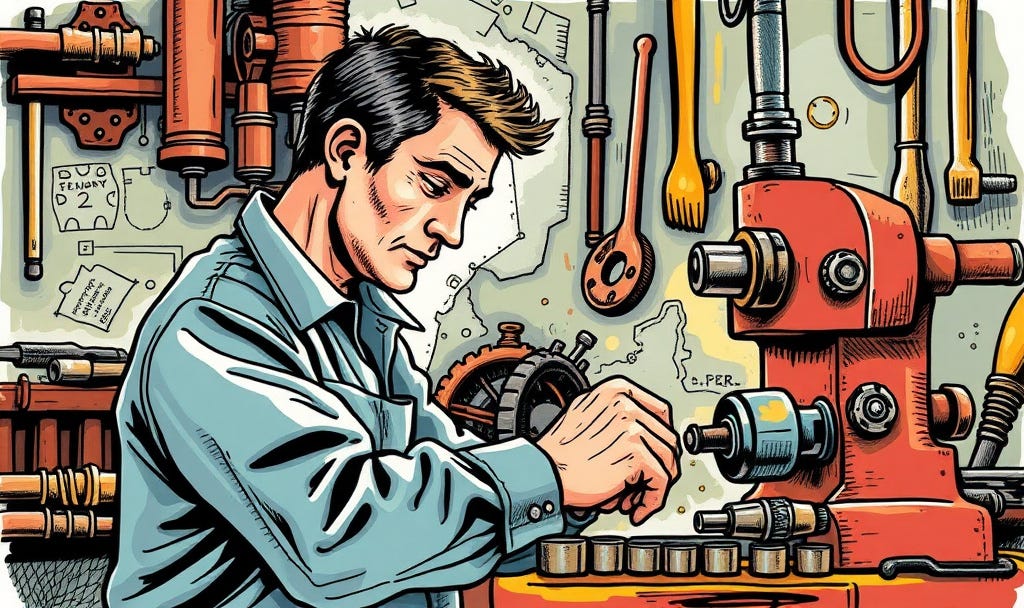I wasn’t thrilled about our town’s Mexican invasion back in the 1990s. I wanted my town to become a mini-Tijuana about as much as I wanted to become a prison wife.
But it didn’t take me long to realize my co-religionists from across the border could drink me under the table, pray me under the table, and work me under the table.
Especially work. Damn, can they work. Whenever the grim labor reaper shows up at their door, they spit in his eye and grab a shovel.
It reminded me of my immigrant grandpa who worked 70 hours a week during World War II as a tool and die maker, then set up his own shop in his garage so he could work during his free time. My dad said he never saw his father so happy.
If you’d asked my grandpa about his life-work balance, he probably would’ve replied that, at 90 hours a week, he had perfected it.
But I can guarantee you he never thought about life-work balance.
“Burnout” to my grandpa was what happened when you fell asleep during a break with a lit cigarette in your hand, and worrying about work burnout would’ve been like worrying about getting laid too much.
You know who else didn’t worry too much about his life-work balance during WWII?
Number 119,104. A/k/a Victor Frankl, working on Nazi railroads during the day and practicing his pickleball at Auschwitz during the evening.
Yet from the smoke and the gas of that man-made hell Frankl found meaning. He developed an entire theory of psychology from the experience: logotherapy.
In my grandpa’s micro-hell that he didn’t even recognize as hell, he found a shit-ton of money and bought a family vacation cottage on Lake Huron that my grandkids enjoy 80 years later.
I’m not saying you should work 90 hours a week, and I’m not waiting for Rod Dreher to write The Auchschwitz Option.
I am saying you need to defocus (Frankl’s word), like my grandpa as he yanked another chunk of metal onto his worktable and the survivors at Auschwitz did after being reduced to their naked existence (another Franklism).
Defocus from what?
From the vicious circle jerk formations and feedback mechanisms that make us neurotic, said Frankl. Instead of preserving our pleasures and freaking out whenever something might tread on them, we should just focus on something (defocus from ourselves), thereby breaking up the “self-centredness of the neurotic” (Frankl).
For Frankl, the focus must be on meaning.
For my grandpa, it was on surviving and thriving in America when he still could’ve been trapped in the Soviet Union (and probably living in the Gulag, which is where Stalin sent most of my grandpa’s relatives who didn’t flee the Germanic Volga region).
When a major flood hit Topeka, Kansas in 1951, the authorities got men from the local asylum, some of whom had been hospitalized for over 20 years, to haul sandbags. Their supervising psychologist was “astonished” to see them “not only loading and placing sandbags with the rest of us, but effectively supervising us in the loading and placement of the bags.” This continued for several days. When the emergency was over, the patients passed back into their deteriorated state of mind.
Meaning, work, focus. They have one thing in common: they swirl outside our f-ed up little heads.
I’ve been watching those Mexicans in my town for 25 years now.
You know where those Mexicans find meaning?
In their families. Mexicans don’t just out-work, -play, and -pray gringos. They also out-family them. When they’re not working and praying, they’re drinking . . . with their families, with their kids running around. And when they’re doing none of those things, they’re out-hanging us with their families, sometimes contentedly lounging for hours in one another’s company.
Family: It’s where tradition tells us we should find meaning.
But in a modern landscape that is set up to tear apart the family, more and more people don’t have a family to occupy their focus.
So they worry about their pickleball game.
Eric Scheske has written for dozens of print publications. You can find more original essays at The Daily Eudemon, one of the Internet’s longest-running blogs.


